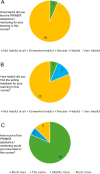Development of the PeeR Investigators Mentoring Experiences in Research (PRIMER) program: a peer mentoring initiative to increase mentoring in CUREs
- PMID: 40444976
- PMCID: PMC12369331
- DOI: 10.1128/jmbe.00048-25
Development of the PeeR Investigators Mentoring Experiences in Research (PRIMER) program: a peer mentoring initiative to increase mentoring in CUREs
Abstract
The PeeR Investigators Mentoring Experiences in Research (PRIMER) program was developed to enhance mentorship and support in Course-based Undergraduate Research Experiences (CUREs) at our institution. This program leverages PRIMER's prior research experience in computational biology courses to mentor students in our bioinformatics-focused CUREs. PRIMERs guide students through research projects and provide tailored support in technical research tasks and scientific writing. They also provide mentoring to students through the research process and help them navigate the next steps in seeking out additional research experiences. PRIMERs, who consist of current undergraduates and recent graduates of our program, undergo training on engaging students in research, peer mentoring, and providing constructive feedback on written assignments. This study reports on the first iteration of the PRIMER program, evaluating its design and impact on the professional development of PRIMERs through focus groups and its effectiveness within our CUREs through student surveys. Findings indicate that PRIMERs developed valuable transferable skills, particularly in scientific communication, providing feedback, and peer mentoring. Students involved in the CUREs aligned with the PRIMER program reported that PRIMERs played an integral role in enhancing their learning experience, offering research support, and fostering a positive research environment.
Keywords: Course-based Undergraduate Research Experience (CURE); bioinformatics; peer mentoring; professional development; undergraduate research.
Conflict of interest statement
The authors declare no conflict of interest.
Figures




References
-
- Auchincloss LC, Laursen SL, Branchaw JL, Eagan K, Graham M, Hanauer DI, Lawrie G, McLinn CM, Pelaez N, Rowland S, Towns M, Trautmann NM, Varma-Nelson P, Weston TJ, Dolan EL. 2014. Assessment of course-based undergraduate research experiences: a meeting report. CBE Life Sci Educ 13:29–40. doi: 10.1187/cbe.14-01-0004 - DOI - PMC - PubMed
-
- Dierker L, Rose J, Nazzaro V, Kabacoff R, Gooyabadi M, Kaparakis E. 2024. A course-based undergraduate research experience (CURE) in statistics: enhancing educational outcomes and promoting access to data-driven careers. J Res Math Educ 55:239–251. doi: 10.5951/jresematheduc-2023-0109 - DOI
-
- Dillon HE. 2020. Development of a mentoring course-based undergraduate research experience (M-CURE). SPUR 3:26–34. doi: 10.18833/spur/3/4/7 - DOI
Grants and funding
LinkOut - more resources
Full Text Sources

